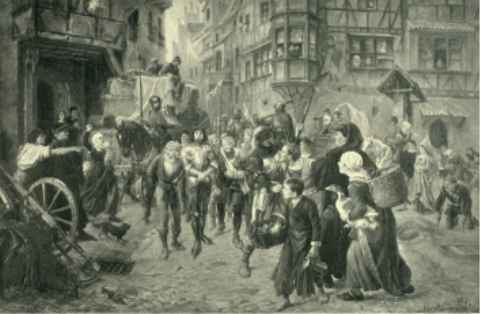Assmannshausen
St.
Clement's Chapel

The
Imprisoned Robber Knight
Nach dem Gemalde von Konrad Weigand
(zur Sage: Die Clemenskapelle)
There is a very melancholy legend connected with
the
foundation of St. Clement's church, which was built on the banks of the
Rhine
and which, not long since, was rebuilt and renovated by the generosity
of
the present great lady of Rheinstein Castle.
Rudolphus of Habsburg, elected emperor after the
terrible
anarchy which had reigned in Germany when the land was left without a
ruler,
determined by firm and vigorous government, to put an end to the
evil-doings
of the robber-knights who held sway along the Rhine.
He had already threatened these much-dreaded
nobles who
disturbed the peace of the country and the government of its ruler, and
now
hearing that they still continued their ravages, the emperor appeared
himself
in the Rhine countries, resolved to annihilate them and to destroy
their
strongholds.
On his way through the land, Rudolphus set fire to
all
the strongholds on the upper Rhine. The burning of the castles of
Reichenstein,
Sooneck, Helmburg and others, was an awful sight to the inhabitants of
the
valley below. Numerous members of these ancient noble races met the
death
of felons, and their bodies were hung up on trees as a warning to
others.
Through the gates of Mainz many a robber-baron was
led
as a prisoner by the soldiers of the emperor. Every time that one of
these
barons and his companions-in-arms were led along with bound hands,
towards
the imperial tribunal, young and old, rich and poor poured forth from
the
streets and alleys, and accompanied the highborn malefactors with
curses.
The windows of the houses around were filled with eager onlookers,
admiring
the conduct of their emperor.
Moaning and wailing were then heard throughout the
land,
mothers, wives, and daughters, weeping for their dead. On the other
hand
the merchants who had endured hardships and sufferings during these
years,
were now delighted with the stern justice dealt out by the emperor.
Under cover of darkness stealthy forms could be
seen
creeping to the place of execution, and silently and mournfully taking
away
the bodies of their relatives to preserve them from ignominious
destruction.
They then buried the wretched remains in consecrated ground, hoping
thus
to satisfy the fears which haunted them of future punishment, for many
of
their dear ones had stained their swords with the blood of their
neighbours.
In order to atone for these sins, and in
accordance with
the wise counsel of a priest, the trees on which the bodies had been
hanged
were cut down, and the wood used to build a chapel of expiation. Stones
were
also taken from the smoking ruins of the burning castles and employed
for
the same purpose. The little church was built on the lonely place of
execution
on the Rhine near Assmannshausen.
The day arrived
– a day of great
sorrow and
weeping
– when all was ready,
and the priest was
to read prayers from the
altar
for the first time. Many funeral barges were to be seen on the river,
bringing
the dead.
The Archbishop of Mayence absolved the bodies from
their
sins, and afterwards they were all interred together near the little
church
for the second time.
This occurred towards the end of the thirteenth
century.
For long years afterwards prayers were offered up in this church in
Assrnannshausen for the souls of the dead.
The once proud and mighty races gradually died
out, and
their strongholds fell into ruins. And time which had demolished the
castles
on the heights above, began her work of destruction on the little
church
below; its roof decayed and its walls crumbled.
The ancient little church of St. Clement has since
that
time been raised again from its ruins, and now the voice of God's
priest
is heard chanting in it again, as it was heard six hundred years ago.
Click
 to go to the next
section of
the Legends of the Rhine to go to the next
section of
the Legends of the Rhine
|

